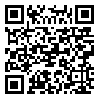Volume 12, Issue 6 (November-December 2013)
Payesh 2013, 12(6): 679-690 |
Back to browse issues page
Download citation:
BibTeX | RIS | EndNote | Medlars | ProCite | Reference Manager | RefWorks
Send citation to:



BibTeX | RIS | EndNote | Medlars | ProCite | Reference Manager | RefWorks
Send citation to:
Shohreh Naderimagham, Shamsoddin Niknami, Farid Abolhassani, Ebrahim Hajizadeh. Development and psychometric properties of perceived self-efficacy scale (SES) for self-care in middle-aged patients with diabetes mellitus type 2. Payesh 2013; 12 (6) :679-690
URL: http://payeshjournal.ir/article-1-342-en.html
URL: http://payeshjournal.ir/article-1-342-en.html
1- Department of Health Education, Tarbiat Modares University, Tehran, Iran
2- Department of Health Services, National Institute of Health Research, Tehran University of Medical Sciences, Tehran, Iran
3- Department of Bio statistics, Faculty of Medical Sciences, Tarbiat Modares University, Tehran, Iran
2- Department of Health Services, National Institute of Health Research, Tehran University of Medical Sciences, Tehran, Iran
3- Department of Bio statistics, Faculty of Medical Sciences, Tarbiat Modares University, Tehran, Iran
Abstract: (7003 Views)
Methods: This was a two-phase study that was conducted during 2009 to 2011 in Tehran, Iran. First, an item pool was prepared according to the literature, focus group discussions, and expert panel. In the quantitative part of the study; content, face and construct validity using factor analysis (both exploratory and confirmatory) were performed and reliability (internal consistency and test-retest) was determined for assessing the psychometric properties of the scale.
Results: A 21-item questionnaire was developed through the qualitative phase. In face and content validity process 3 items were dropped. Exploratory factor analysis loaded 17 items with a five-factor solution (nutrition, physical activity, self monitoring of blood glucose, foot care and smoking) that jointly accounted for 67.4% of observed variance. The confirmatory factor analysis showed a good fit to the data. Cronbach’s alpha coefficient indicated a good consistency (α=0.85), and test-retest of the scale with 2-weeks interval confirmed appropriate stability for the scale (ICC=0.81).
Conclusion: The findings showed the designed questionnaire can assess the self-efficacy for self-care in middle-aged (30-60 years old) patients with type II diabetes. It is a short and easy to use questionnaire and contains the 5 most important diabetes related behaviors which need self-efficacy for self-care.
Results: A 21-item questionnaire was developed through the qualitative phase. In face and content validity process 3 items were dropped. Exploratory factor analysis loaded 17 items with a five-factor solution (nutrition, physical activity, self monitoring of blood glucose, foot care and smoking) that jointly accounted for 67.4% of observed variance. The confirmatory factor analysis showed a good fit to the data. Cronbach’s alpha coefficient indicated a good consistency (α=0.85), and test-retest of the scale with 2-weeks interval confirmed appropriate stability for the scale (ICC=0.81).
Conclusion: The findings showed the designed questionnaire can assess the self-efficacy for self-care in middle-aged (30-60 years old) patients with type II diabetes. It is a short and easy to use questionnaire and contains the 5 most important diabetes related behaviors which need self-efficacy for self-care.
type of study: Descriptive |
Accepted: 2012/07/16 | ePublished ahead of print: 2013/08/24 | Published: 2013/11/15
Accepted: 2012/07/16 | ePublished ahead of print: 2013/08/24 | Published: 2013/11/15
| Rights and Permissions | |
 |
This work is licensed under a Creative Commons Attribution-NonCommercial 4.0 International License. |





